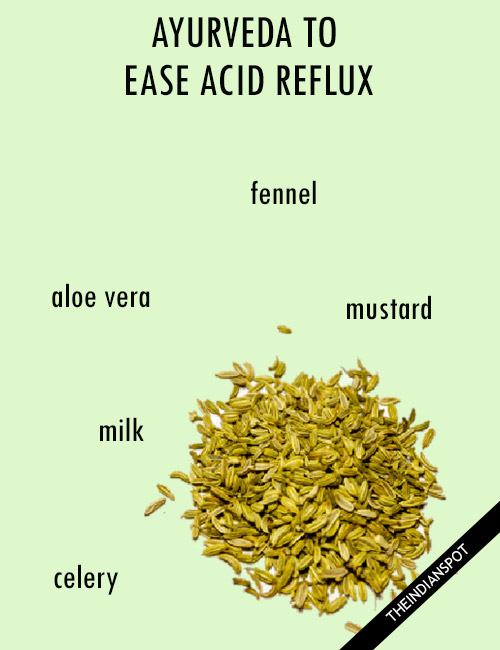Individuals with a Pitta imbalance are susceptible to hyperacidity, acid reflux, peptic ulcers, and some types of inflammatory disorders. Stress, anger, impatience, extra-hot spicy foods, and environmental factors such as extreme heat can aggravate Pitta. A few simple changes in lifestyle and diet can help bring Pitta into balance for smoother, more effective digestion and greater calm and contentment. Here are the top Ayurveda tips to ease acid reflux:
 ALOE VERA JUICE
ALOE VERA JUICE
This wonder herb aloe vera soothes burning skin as well as burning esophageal lining! Aloe vera can reduce inflammation of oesophagus as well as of stomach. It can even heal the existing damage caused by acid reflux and heartburn. If you have severe problem due to acid reflux, have half a cup of aloe juice before each meal. However watch out for its laxative properties too.
YELLOW MUSTARD
Yellow mustard is another popular home remedy for acid reflux as it helps neutralize stomach acid. The vinegar content in this food is a weak acid that lowers the pH of stomach acid. When acid reflux strikes, eat one teaspoon of plain yellow mustard for instant relief. If it is too strong for you, follow it with a glass of water.
COLD MILK
Milk has a high amount of calcium that helps it prevent acid build up and absorbs the excess acid produced, thereby reducing the symptoms of acidity. The fact that it is cold also provides instant relief from the burning sensation one feels during acid reflux. It is essential that you have the milk cold and without any additives like sugar. You could even mix it with a spoon of ghee to make the remedy even more effective.
HAVE PROPER BREAKFAST
It is important to not skip meals if you suffer from acid indigestion. Eating breakfast is especially crucial. Even if you are not especially hungry in the morning, it is important to at least take something light like stewed fruit, warm milk, or a date shake. Skipping breakfast has the effect of aggravating a subdosha of Pitta called Sadhaka Pitta, which governs the emotional heart. It is responsible for contentment and bliss. As lunch time approaches, with agni (the digestive fire) increasing and also stomach acid, an empty stomach is not ideal from the ayurvedic viewpoint.
ELEVATED SLEEPING POSITION
Raise the head and upper body into an elevated position during sleep to provide relief for breathing problems. Raising the upper body may prevent regurgitation of stomach contents and relieve coughing and choking. Use either an acid reflux pillow wedge or raise the head of the bed by 4 to 6 inches.
FENNEL
Fennel is highly beneficial for improving digestion and suppressing stomach spasms. It has a compound called anethole that helps calm spasms in the gastrointestinal tract and has anti-inflammatory effects. Simply chew one-half teaspoon of fennel seeds after meals. Alternatively, you can boil one teaspoon of fennel seeds in a cup of water. Let it steep for 10 minutes and then strain it. Drink it two or three times a day for a few days.
ADDITIONAL TIPS:
- Include celery in your meals. Have celery before going to bed.
- Chew gum (sugar free chewing gum) after meal. This triggers the production of saliva which in turn washes away the acid in your throat and oesophagus.
- Try to avoid high-stress situations, and practice stress-management techniques. Enjoy natural beauty. The appreciation of natural beauty helps to balance Sadhaka Pitta and reduces stress.
- Pomegranate juice and pomegranate chutney also help balance the acid in the stomach. It tastes sour, but it is actually both astringent and bitter, which help balance Pitta.
- Avoid foods that are rich in oils and fats. These foods are difficult to digest, so they may make the stomach release more acids.
- Eat dinner two to three hours before sleeping time as it keeps you healthy.